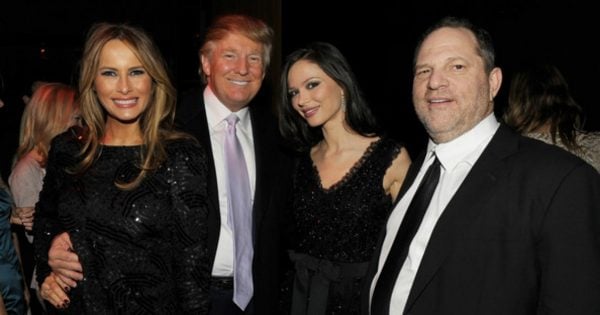“When you’re a star, they let you do it. You can do anything.”
One year ago, almost to the day, audio of Donald Trump speaking to Access Hollywood host Billy Bush in 2004 was leaked, one month before the US election.
In the recording, he can be heard telling Bush about his attempts to pursue Bush’s co-host, Nancy O’Dell. “I moved on her, and I failed. I’ll admit it. I did try and f*ck her. She was married,” he says.
“You know, I’m automatically attracted to beautiful — I just start kissing them. It’s like a magnet. Just kiss. I don’t even wait. And when you’re a star, they let you do it. You can do anything.
“Grab ’em by the pussy. You can do anything.”
Now, an eerily similar recording has been released of Hollywood producer and studio executive Harvey Weinstein in 2015, trying to convince model Ambra Gutierrez to join him in his hotel room.
He doesn’t ask her to come in, he tells her. When she says she doesn’t feel safe because he “groped” her breast the day prior, Weinstein responds, “Oh, please, I’m sorry, just come on in. I’m used to that. Come on. Please.”
“You’re used to that?” Gutierrez asks.
“Yes. Come in… I won’t do it again, come on, sit here,” Weinstein urges.
LISTEN: ‘Secret recording of Harvey Weinstein’ from the The New Yorker.
For any woman, Weinstein’s tone is disturbing. He expects obedience. His frustration is palpable. Haunting yet familiar.
When asked about Harvey Weinstein over the weekend, President Trump said he “was not at all surprised” by the allegations, admitting to having “known Harvey Weinstein for a long time”. In response to whether Weinstein’s behaviour was inappropriate, Trump didn’t personally weigh in, simply commenting, “well, he says they were inappropriate”.





























































































